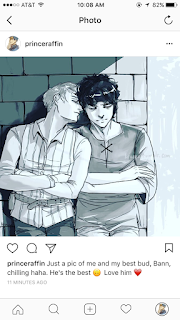Category A, Topic D on Gender
By Marissa Secades
“I know a Graceling when I see one.” He
jabbed with his sword, and she rolled out of the way. “Let me see the colors of
your eyes, boy. I’ll cut them out. Don’t think I won’t.”
It gave her some pleasure to knock him on
the head with the hilt of her knife. She grabbed his hair, dragged him onto his
back, and dropped a pill onto his tongue. They would all say, when they woke to
their headaches and their shame, that the culprit had been a Graceling boy,
Graced with fighting, acting alone. They would assume she was a boy, because in
her plain trousers and hood she looked like one, and because when people were
attacked it never occurred to anyone that it might have been a girl. And none
of them had caught a glimpse of Oll or Giddon: She had seen to that.
Cashore,
Kristin. Graceling (Graceling Realm Book 1) (Kindle Locations 115-120).
Houghton Mifflin Harcourt. Kindle Edition.
I chose this
particular passage from the Part One, Chapter One because when I read the quote
for the first time, I remember having to go back and re-read it, thinking I had
misread the gender pronoun the castle guard uses in referring to Katsa. He very
explicitly refers to her as a he when he calls her “boy” (115). At first
glance, this may just seem like an honest mistake made by the castle guard.
However, the paragraph immediately following the castle guard’s quote indicates
otherwise, as the narrator explains the common trend to incorrectly assume
another’s gender identity, with a particular focus on these next two lines. “They would all say, when they woke to their
headaches and their shame, that the culprit had been a Graceling boy, Graced with fighting, acting alone.
They would assume she was a boy, because in her plain trousers and hood she
looked like one, and because when people were attacked it never occurred to
anyone that it might have been a girl” (118). Thus, two conflicts with the idea
of gender identity and misassumption arise.
First, the castle
guard’s use of the word “boy” has much more significance than just a
misassumption of gender identity. Historically, this word has been frequently
used as a derogatory insult, most customarily aimed at young black men in both the
southern and northern regions of the United States. Essentially, “boy” is used
by someone— in this case, the castle guard— who is looking to assert his or her
power and dominance over the other through degradation of identity. We see this
all throughout literature as well, with other popular books for young
adolescents, like J.D. Salinger’s Catcher
of the Rye, using the word “boy” in a similar fashion and for the same
effect as here in Graceling.
Secondly, the
passage as gender identity being assumed through physical appearances— like
“her plain trousers” (118)— and traditionally masculine characteristics— like
“fighting, acting alone” (118). If the castle guard is following traditional
gender stereotypes, as he seems to be, then in his mind Katsa could not be
female. She must be male because a female would not fit into the male-molded
stereotype that have been established as traditional gender identities.







